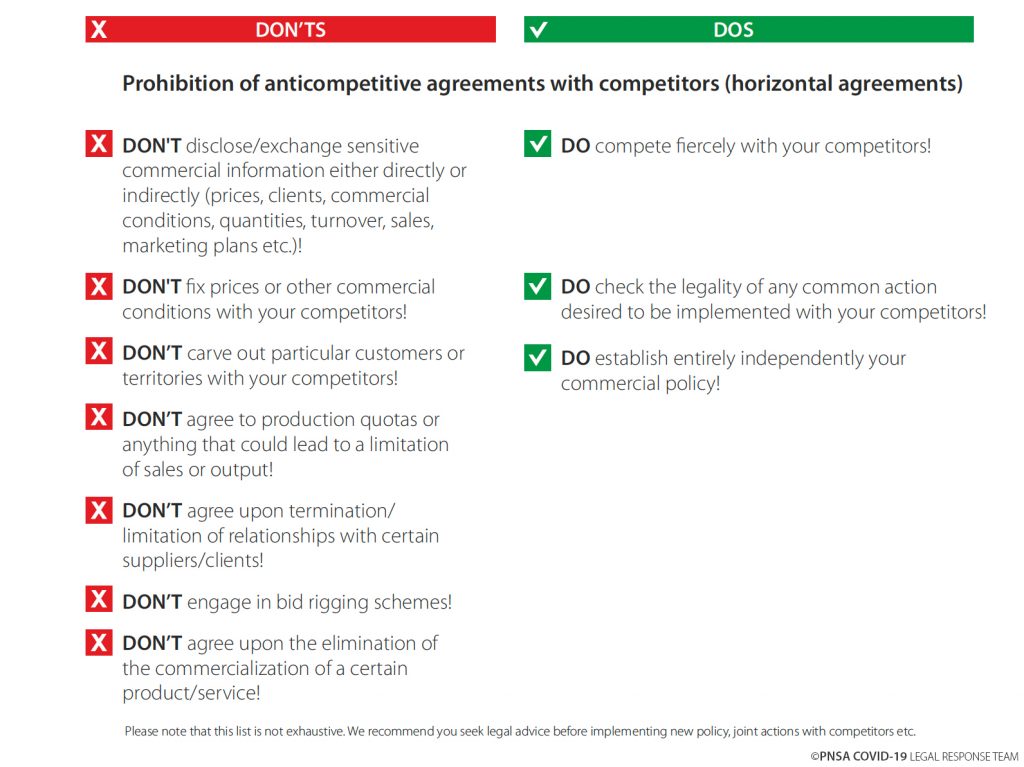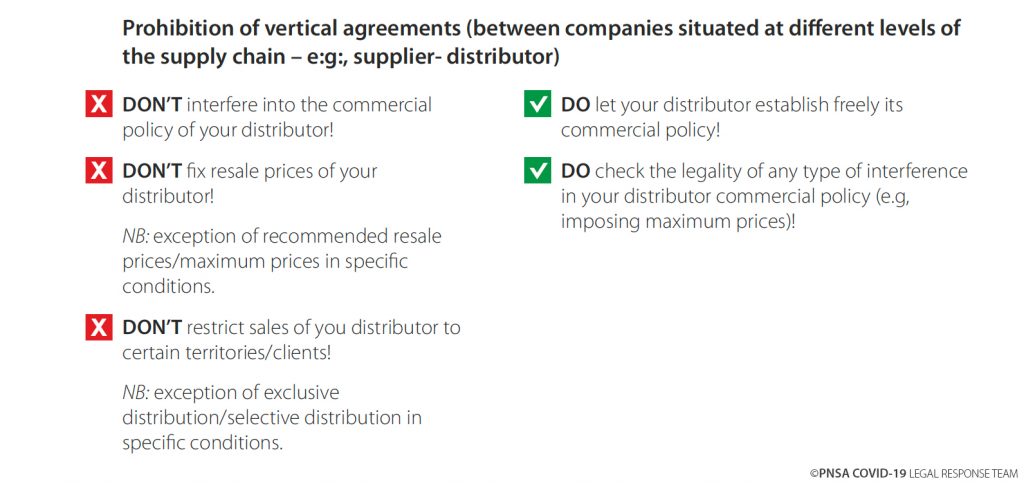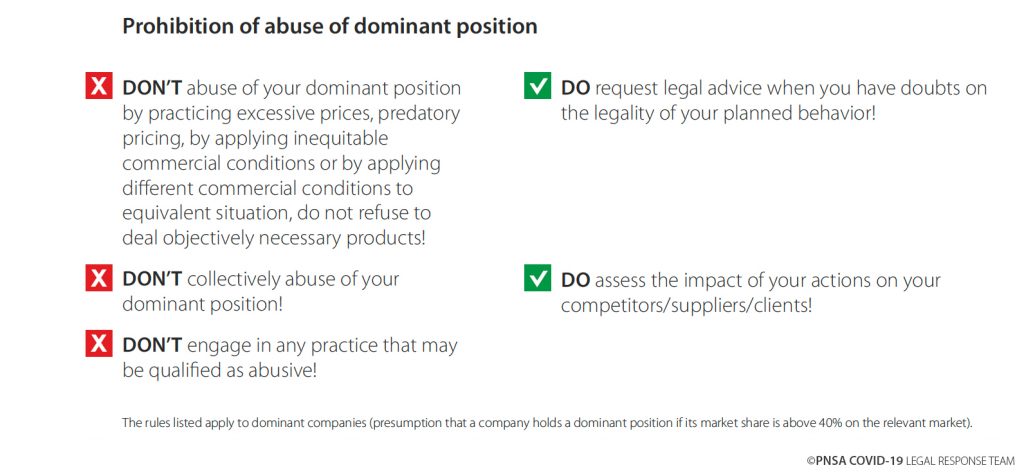Introduction
No stop button on competition rules
In crisis situations the risks of market operations are higher, thus companies are incentivized to coordinate their behavior or unilaterally impose specific measures.
Nonetheless, such practices may have anticompetitive outcome and thus may be sanctioned by competition authorities.
Please remember: fines that may be imposed are significant – from 0,5% to 10% of the total turnover generated in the year prior to the Romanian Competition Council’s sanctioning decision (“RCC”).
| Competition regulations are not suspended during crisis. We all have other important things to do in this period, we know (taking care of our employees, families) but we need to be particularly careful and ensure in the same time that our action will be fully compliant with competition regulations. Why: because after all this will end – and it will – the competition authorities will pay particular attention to the way companies acted during this period! |
In other words, COVID-19 pandemic cannot be used as a justification for infringing competition regulations (including merger control rules). The crisis situation generated by COVID-19 pandemic could, at most, be deemed as a mitigating circumstance if sanctions were to be applied for practices aiming at limiting the spread of the virus which have anticompetitive effects.
Thus, any measure taken into the context of the COVID-19 pandemic shall not lead to competition restrictions. This interpretation is clear cut as it was confirmed by the RCC. This because:
- Competition regulations prohibit any agreement/concerted practice that restricts competition by object of effect (article 5 of Competition law no 21/1996 – “Competition law”). The key principle is that each economic operator must establish independently its commercial policy.
- In the same time, unilateral conduct is also addressed under competition regulations – article 6 of the Competition law prohibits abuses of dominant position.
Nonetheless, cooperation may be necessary in order to fight against the COVID-19 pandemic spread and effects on economy. In this sense, some forms of collaboration between competitors are allowed under certain circumstances as listed at section 1.4 here below. Please be aware that any form of cooperation between competitors raise competition risks and there is no general answer – a case-by-case analysis is required. Thus, it is essential to conduct an in-depth competition assessment before entering into such collaborations schemes. Moreover you can seek advice from the RCC itself in order to obtain formal/informal comfort.
Also, in the context of COVID-19 outbreak, the RCC has given green light to managers of e-commerce platforms may impose measures in order to limit unjustified price increases for basic products and services.
State of emergency – impact on competition?
| COVID-19 pandemic triggered the instauration of a state of emergency in Romania through the Presidential Decree no. 195/2020.
In this sense (a) public central authorities may requisition production facilities for materials and equipment necessary for the fight against the spread of the virus and (b) prices for medicine, medical devices, strictly necessary food items and public utilities (energy, oil etc.) may be regulated (in the limit of the average prices practiced in the last 3 months). In other words, in certain sectors, competition in the market will be State regulated. |
What about the Competition Council dawn raids?
As per the Decree no. 195/2020, during the state of emergency, controls conducted by Labor Territorial Inspection Units are suspended. Therefore there is no specific provision that limits during this period the right of the RCC to conduct dawn raids. However, as the RCC limits its public activity& companies already implemented safeguards for their employees (homework), the dawn raid activity would be rather limited.
Basic general competition rules – Dos and Don’ts




Specific potential actions in the context of COVID-19 pandemic – What is actually forbidden?
1. May I increase the prices for basic products/services sold as a result of the increase in demand in the context of COVID-19 pandemic?
NO, if this you are a dominant company (market share above 40%) or the prices are the result of an agreement with other competitors.
Price increases in the context of a crisis (so-called price gouging) is addressed by competition regulations under the prohibition of excessive prices as a form of abuse of dominant position.
Therefore, if you are a company with a market share above 40% DO NOT increase prices for basic products (e.g., grocery) or products used in order to protect from COVID-19 (e.g., protective gear, hand sanitizers) if you do not have an objective justification.
In any case, even if you are not in dominant position, we recommend to document each price increase (especially a significant one; by reference to objective justifications – increase of costs).
NB: The RCC is currently monitoring unjustified prices increases and has opened an investigation regarding the sudden and excessive increase of prices for products & protection equipment.
2. May I agree with competitors upon the level of the salaries /other benefits of the employees?
NO: as competition regulations strictly forbid agreements which aim at cost fixing, Thus, avoid coordination with competitors that results in fixing the salaries and other similar costs. Also do not exchange company-specific information about employee compensation with another company.
3. May I agree with competitors upon specific measures aiming at limiting economical negative effects of COVID-19 pandemic such as reduction of capacity of production/sale, coordinated price increases, market/client sharing?
NO: cartels crisis is not allowed: as competition regulations strictly forbid agreements which aim at price fixing, output restrictions, market sharing. Thus, avoid coordination with competitors that results in price fixing, reduction of output or capacity or sharing of customers or markets.
COVID-19 pandemic is not a justification/a valid excuse!
Examples: CJEU, Case C-209/07, Irish Beef – In the context of a structural crisis, the principal Irish beef processors by which they intended to reduce the total capacity of the industry by 25% within one year. The CJEU held that the proposed agreement to reduce capacity constituted a restriction of competition by object. It is irrelevant that the parties acted with the objective of remedying the effects of a crisis in their sector.
In such context of crisis, you may argue that the agreement concluded, even if it is anticompetitive, it generates positive effects that outweigh its negative effects – the so called efficiencies test (article 5 paragraph 2 of the Competition law). However, efficiencies are hard to prove in practice! This especially because one most prove that there was no other less restrictive way to achieve the same result that through the restriction in question (the so-called indispensability condition).
NB: Even unilateral disclosure or exchange of sensitive information regarding prices and any other commercial, capacity of production/sale, quantities, clients are forbidden under competition regulations.
4. May I agree with my competitors not to sell/buy from companies which have not taken proper measures in order to limit the spread of the virus?
NO, as every commercial decision must be entirely independent. Such coordination may be qualified as a boycott aiming at eliminating of the market the company subject to the coordinated refusal to deal.
5. May I refuse to supply products to certain partners?
NO, if you are in dominant position and your product is objectively necessary for your partner to compete on the downstream, market and you do not have an objective justification for your refusal (e.g., not enough quantity, the partner ceased to pay its debts towards you).
6. May I tie sales of protective masks to the acquisition of hand sanitizer or vice-versa?
NO, if you are a company in dominant position tying sales are strictly forbidden.
NB: Even if you are not a dominant company, bundled sales are regulated by consumer protection laws – the key principle is to offer the consumer the possibility of buying separately each of the products part of the package.
7. May I impose resale prices to my distributors in order to limit their price increases?
NO, as resale price maintenance (RPM) if strictly forbidden under competition regulations.
Nonetheless, if the market share of the supplier, respectively the distributor’s market share on the supply market of the product in question, respectively the acquisition market of the product in question is below 30%, the supplier may impose a maximum resale price or recommend a resale price. This provided that these prices not amount to a fixed or minimum sale price as a result of pressure from, or incentives offered.
| In the context of COVID-19 related demand increase, there seems to be little incentive for retailers to decrease their prices and thus there is a risk that maximum/recommended prices work as fix prices. |
If the conditions listed above are not fulfilled and thus RPM is illegal, one may still argue that RPM in the actual context may generate efficiencies that outweigh its negative effects (conditions listed in article 5 paragraph 2 of Competition Law). However, it is very difficult to prove such efficiencies especially by considering the indispensability conditions – there was no other way to achieve the same result other than the RPM restriction.
8. May I choose not to notify/implement a transaction in the current COVID-19 context?
NO, as merger control regulations are not suspended.
Nonetheless, there are specific issues which rise in light of COVID-19 pandemic:
- RCC has announced it partially suspends contact with the public until April, 16 with the possibility of extend this measure. However, RCC did not announce that it will cease its activity – e-mail, telephone and postal communications are still possible. Up until now the RCC has not announced other measures, but other competition authorities did! Thus, the (a) European Commission asked companies to delay submitting merger filings due to the COVID-19 outbreak, (b) whereas in Philippines the competition authority has suspended the acceptance and evaluation of merger notifications for the duration of quarantine, freezing the deadline to submit notifications.
- Collecting & Processing information necessary for the purpose of the notification may be more difficult in light of preventive measures (work from home, self-isolation) – even for the competition authority!
In order to address the problems related to difficulties in filing notifications you make take the following measures:
- If the case, modify the deadline for notification included in your SPA;
- DO NOT implement the transaction before notification!
- If implementation is necessary, approach the RCC in order to obtain a decision granting derogation from the stand-still obligation.
Specific potential actions in the context of COVID-19 pandemic – What is actually permitted?
1. May I refuse to deal with companies that fail to adopt measures in order to protect employees and customers?
Maybe, in such case, even for dominant companies, the refusal to deal may be deemed as justified.Nonetheless (a) please keep in mind that the decision to continue business relationships with companies that do not take adequate measures against COVID-19 spread must be independent and not the result of coordination with other companies. Also, the decision must be based on objective non-discriminatory criteria in order to be able to prove any time that the refusal is justified (b) our local competition authority might say that is the job of public authorities and you should have notified them this situation.
2. May I engage in exchange of information regarding the preventive measures taken against the spread of the virus?
YES, under the following conditions:
- Framework of information exchange must be designed and reviewed by a competition law counsel;
- Any exchange/meeting must follow a strict previously agenda reviewed by a competition counsel and any discussion must be recorded in writing;
- All information must be limited to what is strictly necessary in order to respond to the spread of the virus – e.g.; best practices regarding remote working, travel restrictions etc.;
- Adherence to the best practices with respect to COVID-19 shall be entirely voluntary;
- NO sensitive commercial information shall be exchanged and NO mandatory rules should be established in common.
3. May I participate to trade associations meetings in order to discuss measures to be taken/effects of COVID-19?
YES, but certain rules must be strictly observed.
- Request the agenda of the meeting and make sure no sensitive subjects are envisaged;
- At the meeting, NO discussions/disclosure of sensitive information (e.g., because of the crisis my turnover decreased by x%, X refuses to supply a bigger quantity than y etc.);
- In case, sensitive subjects are approached, distance yourself publicly and expressly from the discussion, record your position in writing and leave immediately the meeting!
- All discussions shall be recorded in writing and the minutes shall be circulated with the members.
4. May I engage in collective lobbying actions (either under the umbrella of a trade association or directly together with other competitors) in order to obtain changes/new legislation related to the limitation of negative effects of COVID-19?
YES, under the following conditions.
Lobbying activities are not prohibited, but may raise competition risks if they have in fact an anticompetitive object or effect. Also, there is a risk of exchange of sensitive information between the competitors part of the lobbying action. In short, in order to limit risks:
- DO analyse thoroughly the necessity & utility of participating at a collective petitioning/lobby action;
- DO make sure that the aim of the collective action does not have an anticompetitive object or may have an anticompetitive effect;
- Do NOT exchange sensitive information within the framework of the collective petitioning action! If information exchange is necessary take preventive measures – black box procedure through a third party that will collect, process and afterwards aggregate the information. In any case, information provided to the third party shall be made only on a strictly necessary to know basis.
- DO NOT engage in any discussion with competitors that may exceed the legitimate aim of the collective action!
You may find further details in the Guidelines issued by the RCC on this subject.
5. May I enter into cooperation agreements with competitors?
Examples:
|
YES, under specific conditions and prior competition assessment.
According to European Commission’s Guidelines on the applicability of Article 101 of the Treaty on the Functioning of the European Union to horizontal co-operation agreements (Guidelines), cooperation agreements may be legitimate and thus are not prohibited outright.
Specifically, in the context of COVID-19 some type of coordination with competitors may be beneficial such as:
- Coordination of the supply of products or services that increased demand as a result of the pandemic in order to meet the demand;
- Development of common standards to ensure limitation of speared of COVID-19;
- Coordinated response to the State requisition of supplies;
- Implementing joint purchasing arrangements.
Nonetheless, there is no absolute green light for such types of agreements. The Guidelines provide specific conditions in which such joint agreements benefit of an exemption and thus are not subject to competition enforcement.
Each type of collaboration between competitors may raise specific competition risks. We mention here inter alia coordination of commercial policy, anti-competitive foreclosure or exchange of sensitive information. These risks are increased when the parties involved have important market share.
For each type of agreement regulated (e.g., joint production/acquisition),j the Guidelines provides a safe-harbor based on market share thresholds under which the agreements (provided they do not contain hardcore restrictions such as price-fixing)
When the market thresholds are surpassed, the positive effects of the agreement must outweigh its negative effects. There are four cumulative conditions:
- The agreement generates efficiencies;
- Consumers must receive a «fair share»;
- The agreement is indispensable – there is no other way, less restrictive in order to achieve the same results as those obtained through the agreement;
- No elimination of competition.
Beware! Such efficiencies are rather difficult to prove, even in the context of a crisis, especially as you need to prove the indispensability condition!
Also, please note that any sharing of competitively sensitive information that is necessary implement the cooperation should be subject to specific safeguards. In this sense, companies should put in place “clean teams”/black-box procedures in order to ensure the information is exchanged on a ‘need to know’ basis to a restricted number of persons which are themselves bound to confidentiality undertakings.
In order to ensure that joint collaboration comply with competition regulations, the framework of the cooperation should be assessed/designed by a competition law specialist. This because any form of cooperation may raise specific competition risks and an in-depth case-by-case assessment is required. For safety, always assess if the coordination is strictly necessary or you could achieve the same result on your own, without deploying excessive efforts.
Also, you may seek advice from the RCC in order to achieve formal/informal comfort with respect to the legality of the collaboration. In exceptional circumstances, you may also try to lobby for the suspension of competition law for certain specific collaborations. For instance, In light of the increase of demand for basic products, UK supermarkets request the government to suspend competition regulation in matters of coordination. Specifically, supermarkets wish to coordinate their shopping deliveries. Such measure would help cover remote areas as well.
6. Specifically, may I engage in reciprocal specialization agreements or joint production agreements?
Reciprocal specialization agreements are agreements whereby two or more parties which are active on the same product market, by virtue of which two or more parties on a reciprocal basis agree to fully or partly cease or refrain from producing certain but different products and to purchase these products from the other parties, who agree to produce and supply them.
Under the Guidelines such agreements are not prohibit, being block exempted if the combined market shares of the parties shall not exceed 20% on any of the relevant markets and provided that no hardcore restrictions are included (e.g., price fixing, limitation of output, allocating markets or customers).
As mentioned above, when the market thresholds are surpassed, the positive effects of the agreement must outweigh its negative effects.
Note: This analysis is based on the legal provisions in force as of 19 March 2020, being subject to any amendments that future enactments may require.














